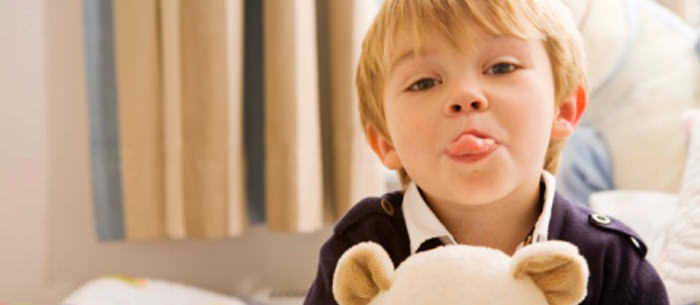After dinner at a friend’s house, you quietly instruct your 5-year-old to thank your host for a nice time. Without blinking an eye, your normally polite child crosses his arms, looks you straight in the eye and says, “No.”
Now what?
In an ideal world, you have an established family system of expectations and rules you can refer to so your child miraculously follows the proper etiquette. But many families don’t always have a cut-and-dried parenting style when it comes to polite behavior. Even if you did, you might be stumped about how to proceed without making a scene and ruining the night.
We asked Dr. Richard Wampler, professor of human development and family studies at Michigan State University, and Dr. Kenneth Ginsburg, Philadelphia pediatrician and author of “Letting Go with Love and Confidence,” for some advice on taming defiant behavior.
-
Have a Script
Do you always think of what you wish you had said? Here is your chance to plan in advance so you know just how to react. Dr. Wampler suggests you lean down and say, “You do understand that not saying thank you is not appropriate, and if you do not say thank you there will be consequences. If you do not say thank you, here is what will happen when we get home.” Then you can calmly state the favorite privilege that will be taken away as a consequence — no television for the next two days or not being able to go to the movies this weekend. -
Stay Calm
We know how hard this one is, especially in the heat of the moment, but it’s essential. If your child won’t comply, escort him right to the car (or to another room), calmly and without showing any of the emotions boiling inside you. State your expectations as if you were reciting a grocery list — as if the behavior is not a problem (even though it is) and not something you’re going to argue about (even though you are ready to pitch your own fit). Keep the consequence serious enough, but fair (even if you want to threaten to take away television for a year). -
Remember You’re Not Alone
Take a deep breath and realize that the behavior, though maddening, is normal. “Kids want to know, ‘What are my limits?'” says Dr. Ginsburg. But that doesn’t mean they won’t push the established boundaries and nearly make their parents give up in frustration. -
Set the Family Rules — Tomorrow
Dr. Wampler recommends having a family talk about expectations and limits, but not in the car on the way home. “Families need to decide on the rules, rewards, and consequences of breaking the rules,” he explains. So if you find yourself confronted again with a child who is being rude and clearly flaunting the family rules, you can calmly implement the consequences. -
Reinforce Positive Behavior
When this episode is done, let it go and don’t harp on it. Parents can build good behavior by using positive reinforcement and being flexible, says Dr. Wampler. “If you get compliance 70 percent of the time, you are really lucky.” -
Set up a Reward
Dr. Wampler suggests implementing a reward system where kids earn a ticket for good behavior and then cash them in for something valuable to them. Negative behavior means tickets will be taken away. Tickets can be worth a trip to the movies, a half an hour with a parent, a one-time later bedtime or an extra television show. Keep rewards within your budget and time constraints, and distribute them (and take them away) in appropriate amounts, so the child sees the process as fair and rewards as reachable. Seeing tickets collect is a powerful motivator for kids to learn to keep their behaviors in check.
Even if your kids know the clear limits, they’re not always going to behave perfectly. But if they know what to expect, you’ll see that rude side less.
Julia Quinn-Szcesuil is an award-winning freelance writer and a mom to two girls. She lives in Massachusetts and has written for local and national publications.






